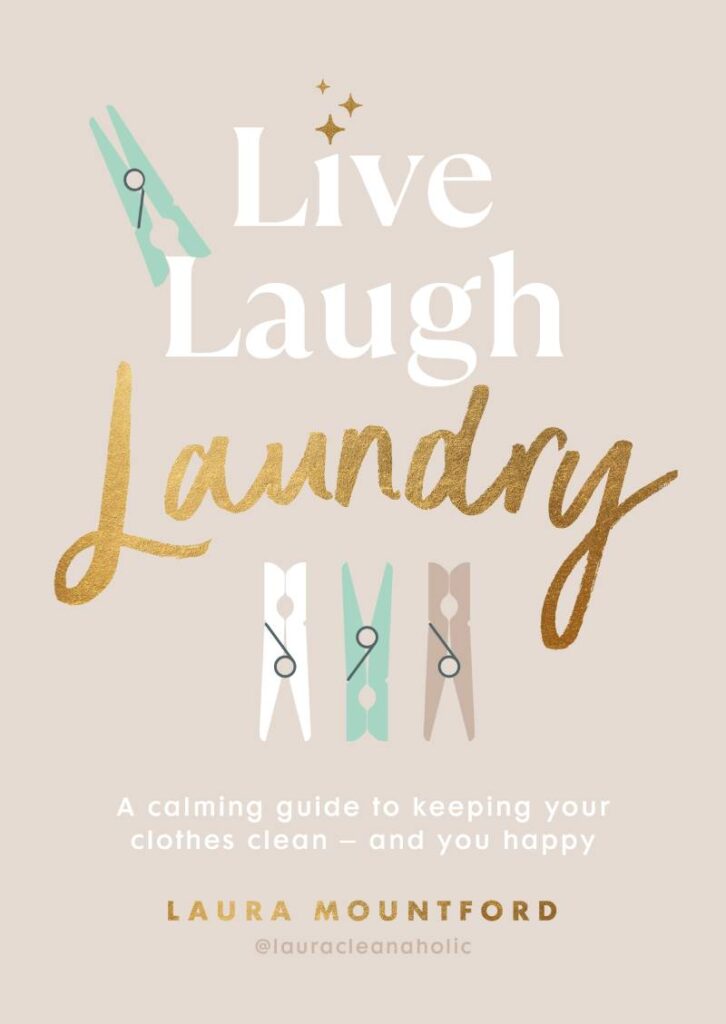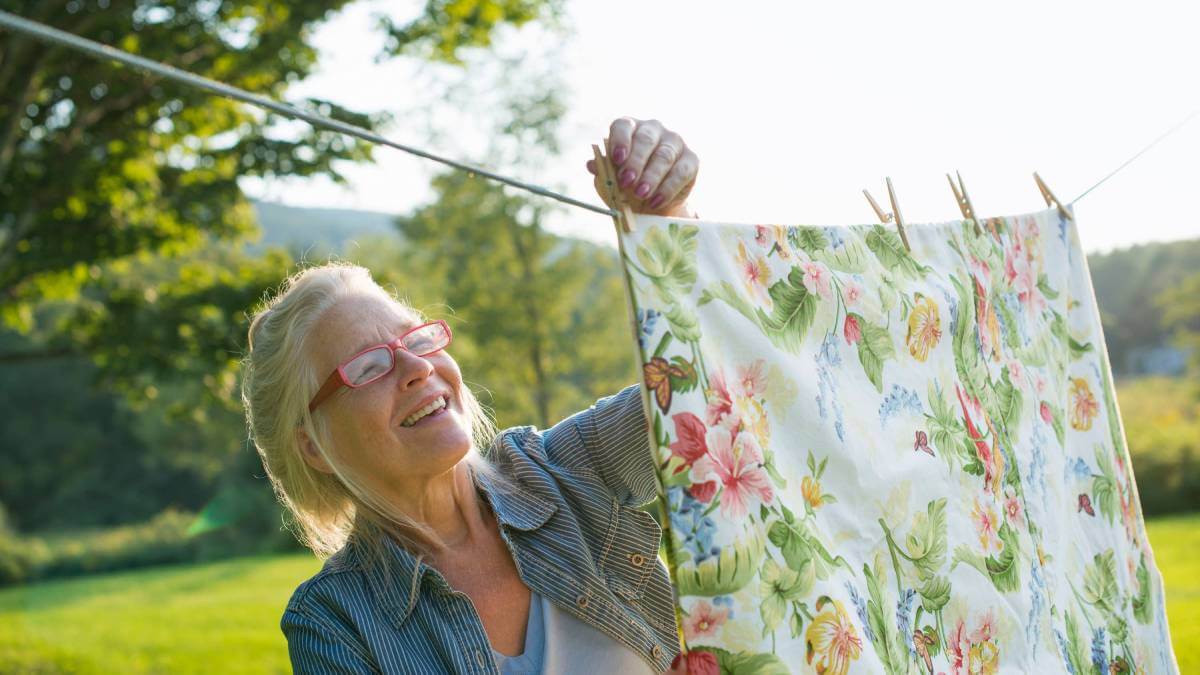Laundry isn’t something most people would describe as fun – but ‘cleanfluencer’ Laura Mountford is on a mission to change that.
At the very least, she hopes to help people get more control over their laundry, and make the process cheaper and more sustainable.
“I think laundry is over-complicated,” says Ms Mountford, who regularly shares cleaning tips with her 555k Instagram followers and has now written a book – Live, Laugh, Laundry.
View this post on Instagram
“Let’s face it, most of us just stick it on a mixed load at 40 degrees and hope for the best, but that’s not necessarily going to be best for our clothes.
“I know it sounds a bit strange, but laundry, and cleaning in general, is part of my self-care routine,” she adds. “We all have to clean our homes and do the laundry, and I used to think of it as a chore that was boring and overwhelming, and I thought how could I change my mindset?
“It’s about finding joy in the little everyday things. Doing the laundry and cleaning is my time when I switch off and focus on filling my mind with positive thoughts,” Ms Mountford adds.
“Little changes – doing less washing, turning the temperature down – will save a lot of money over the year, and the little changes in terms of your mental approach will make you feel less stressed and more in control.”
Want to take control of your laundry? Here are some of Ms Mountford’s top tips.
1. Reduce the temperature
Wet appliances such as washing machines account for around 10 per cent of a typical household’s energy bills. One of the key ways to reduce this is by reducing the wash temperature – washing at 20/30 degrees is particularly worth considering when clothes aren’t heavily soiled.
“Most modern laundry detergents are effective at a low temperature, and when you think about it, 20 degrees isn’t actually cold – if it was water you were getting into, it wouldn’t feel cold,” says Ms Mountford. “We have this mindset that it’s got to be a boiling hot wash to get rid of stains and germs, but the reality is most laundry isn’t really that dirty.”
Even stained items can be washed at cooler temperatures, she says: “As long as you’ve got the right products, you don’t have to use a hot wash, and it really does save so much energy.”
View this post on Instagram
2. Use your machine’s eco settings
Although machine eco functions may take longer, Ms Mountford says they’re worth using: “It’s heating the water up really slowly, so it’s not using as much energy. It takes longer but it’s definitely cheaper.”
3. Reduce the number of washes
Reduce the number of loads you put on, suggests Ms Mountford: “Try to fill your machine each time you use it.”
4. Wear clothes for longer
When it comes to saving money on energy bills, Ms Mountford stresses “it’s the small changes that will make the big impact” – and one small change is wearing clothes for a bit longer.
“If we all tried to wear a piece of clothing one extra time, rather than just chucking it in the laundry basket, what a huge difference it would make – it’d save water and energy, and money as well,” she says. “Does that item need to be washed, or could you just hang it up and freshen it up with a fabric refresher and it’ll last another day?”
5. Get the kids to do their own washing

Many parents end up doing way more washing than they need to because it’s easier for their kids to dump reasonably clean clothes in the laundry basket, rather than pick them off the floor or chair and put them away.
One way of stopping them from doing this is by getting them to do their own laundry, suggests Ms Mountford, whose own mum got her and her siblings to do their own washing when they were teenagers. “She showed us how to do it, and we had laundry baskets in our bedrooms and were responsible for washing, drying and putting away,” Ms Mountford explains. “At the time, I thought why couldn’t my mum just do it, but it sets you up for life because you know no-one else is going to do it if you don’t.
“Kids just need to be mindful about their laundry – and their partners of the future will love you for it!” she adds.
6. Work out the cost of each wash
Each box or bottle of detergent or conditioner will say how many washes it will do, so Ms Mountford advises people to work out how much it costs per wash. “It’s really important to do that,” she says, “because sometimes you can get caught out when something looks like a really good deal, but when you work out the cost per wash you could get it cheaper, usually when you bulk buy.”
Did you know line drying clothes can save energy & money? Learn the top 10 reasons to line dry your laundry: https://t.co/bDpNqJoLKm pic.twitter.com/YfLXbYNcUf
— GoGreenGarland (@GoGreenGarland) September 12, 2019
7. Don’t use too much fabric conditioner
Rather than making clothes smell even better if you use lots of fabric conditioner, using too much can clog up your machine, take longer to rinse, and leave a film on clothes, says Ms Mountford. Using more will obviously cost more, too.
“I definitely used to think the more the merrier with fabric conditioner, because it was going to make my clothes smell really amazing, but that’s not the case when you overuse it,” she says. “You just need to use the recommended amount, which is normally just a capful.”
8. Dry laundry naturally whenever possible
“I love it when it’s sunny outside and you can hang your washing out – it might take you five or 10 minutes, but it’s taking in that fresh air and listening to the birds tweeting and just enjoying those little things in life,” says Ms Mountford.
On wet days, she suggests having several clothes airers dotted around the house, although not in the bedroom because the drying clothes will create damp air while you’re sleeping.
Although she hasn’t got a heated airer, “I’ve heard they’re really good,” she adds – and she does have a dehumidifier, which helps take dampness out of the air and most also have a laundry setting.

Live, Laugh, Laundry by Laura Mountford is published by Ebury Press, available now.
Do you think of cleaning as a part of self-care? What are your most and least favourite chores around the house? Let us know in the comments section below.
Also read: How often should you clean everything in your home?
– With PA


Don’t use fabric softener at all because it makes everything hydrophobic .